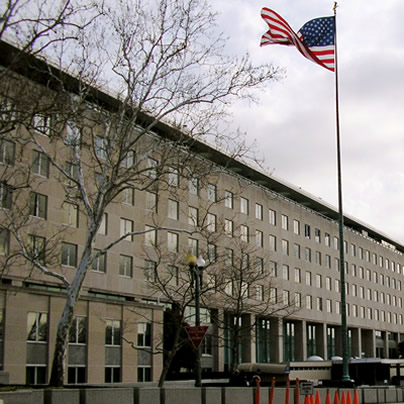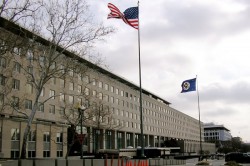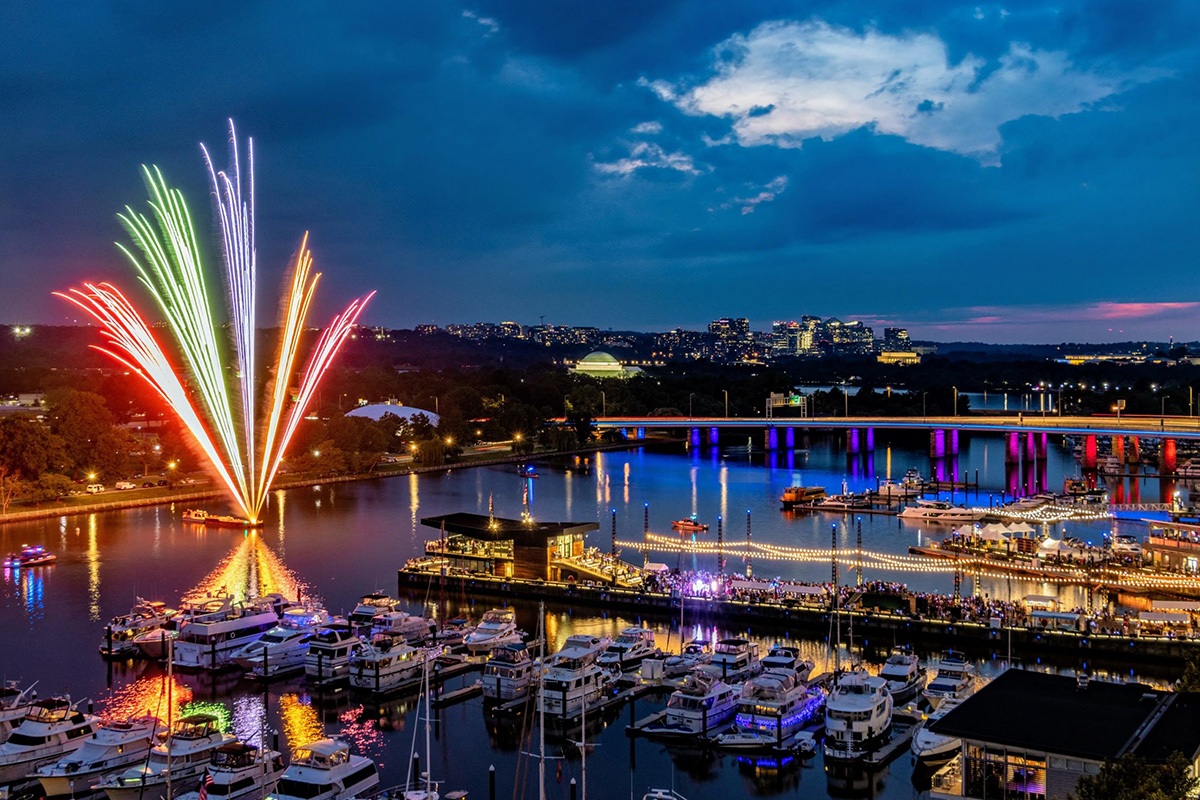News
State Dept. mum on next steps after India ruling
Spokesperson reiterates support for LGBT rights overseas


Supreme Court of India (Photo by Legaleagle86; courtesy Wikimedia Commons)
State Department spokesperson Jen Psaki wouldn’t speculate Wednesday about how the U.S. might encourage India to repeal its law criminalizing homosexual acts when asked about the recent court ruling upholding the colonial-era law.
Under questioning from the Washington Blade, Psaki declined to speculate about the potential options to encourage additional steps in India after she reiterated the Obama administration’s commitment to LGBT rights overseas.
“That’s a decision that the Indian government would make,” Psaki said. “We, obviously, don’t make decisions on behalf of other governments and their legislation. So, I expressed our deep concern about any efforts around the world to not recognize that LGBT rights are human rights and that’s a message we’ll continue to make.”
Earlier in the day, the India Supreme Court overturned a lower court ruling from 2009 that decriminalized the same-sex relations between two men, which was previously illegal under a colonial-era law known as section 377. With the law back in place, individuals found guilty of “unnatural offenses” in the world’s second most populous country could face 10 years in prison.
Psaki said the State Department is “aware of” the decision in response to a first question about the ruling from a reporter during her daily news briefing,
But Psaki responded to the decision initially only by speaking broadly about the Obama administration’s support for LGBT rights, referencing a statement from Secretary of State John Kerry on Human Rights Day.
“We oppose any action that criminalizes consensual same-sex conduct between adults,” Psaki said. “LGBT rights are human rights. That’s something you heard Secretary Kerry say and Secretary Clinton say before him. And we call on all governments to advance equality for LGBT individuals around the world.”
It took questioning from another reporter for Psaki to clarify that U.S. concern with anti-sodomy laws “whether it’s India, or any other country” applies to the recent ruling.
“Any action that criminalizes consensual same-sex conduct between adults, that doesn’t recognize that fundamental freedoms include their right to sexual orientation, those are issues that we certainly would be concerned about as we are here,” Psaki said.
Asked whether the State Department was planning to reach out to the Indian government about the issue, Psaki wouldn’t make any specific predictions, but said human rights issues come up in conversations.
“Well, we consistently bring up human rights issues with most countries we meet with,” Psaki said. “I don’t have any specific recent call or meeting to read out for all of you, but certainly that’s something we’re happy to express publicly and privately.”
Top U.S. officials just recently had the opportunity to speak with Indian officials.
As part of her initial response speaking generally about news related to India, Psaki said Secretary of State John Kerry and other high-ranking State Department officials met on Tuesday with Indian Foreign Secretary Sujatha Singh and agreed to an expansion of strategic partnerships.
“The United States and India agreed … to strengthen new U.S.-India cooperation on training U.S. peacekeepers to develop support for the department’s own peace operations initiative,” she said. “The United States also accepted India’s invitation to serve as a partner country for India’s technology summit and expo in New Delhi in the fall of 2014, further intensifying our broad scientific cooperation.”
Asked whether the Supreme Court decision came up during this discussion, Psaki said she believes it happened before the ruling was handed down. When another reporter mentioned other related meetings were taking place today, Psaki said she’d have to check to verify that and whether any discussions about the ruling took place.
“I don’t have any other comment for you on the Supreme Court case than what I just offered or any other expectations of steps,” Psaki said. “That’s obviously steps the Indian government would take.”
After a reporter pointed out that the State Department would make threats aimed at Ukraine after it used violence to stop peaceful protests, but that it won’t take similar action in the India case, Psaki said the situations were different.
“Obviously, the events in Ukraine, we expressed our deep concern and the reasons why,” Psaki said. “And, as you know, we don’t group every country and everything that happens into the same category. Every circumstance is different.”
A transcript of the exchange follows:

U.S. Department of State (Photo public domain)
QUESTION: Thank you. You must have seen the Indian Supreme Court decision criminalizing homosexuality, which has sent shockwaves in the global LGBT community. And it’s more important, because only yesterday, Secretary Kerry issued a statement on Human Rights Day, and in which he mentioned LGBT. So what is the reaction that – and especially because the Indian foreign secretary is in town?
MS. PSAKI: Mm-hmm. Well, we, of course, are aware of the Supreme Court decision. The United States places great importance on the protection of human rights and fundamental freedoms of all people. And as you saw and as you referenced in the Secretary’s statement yesterday, that includes lesbian, gay, bisexual, and transgender persons around the world. We oppose any action that criminalizes consensual same-sex conduct between adults. LGBT rights are human rights. That’s something you’ve heard Secretary Kerry say, I believe Secretary Clinton say before him, and we call on all governments to advance equality for LGBT individuals around the world.
I know you asked me about the visit of the foreign secretary. I’m happy to give a readout of that, if that’s helpful as well. Secretary Kerry and Deputy Secretary Burns met yesterday with Indian Foreign Secretary Singh to discuss ways to deepen the U.S.-India Strategic Partnership and consult on regional issues. Foreign Secretary Singh also met with Acting Under Secretary Rose Gottemoeller, Assistant Secretary for South and Central Asia Nisha Biswal, and other senior officials.
The United States and India agree to joint principles to strengthen India-U.S. cooperation on training UN peacekeepers, developed with support from the Department’s Global Peace Operations Initiative. The United States also accepted India’s invitation to serve as a partner country for India’s technology summit and expo in New Delhi in the fall of 2014, further intensifying our broad scientific cooperation.
QUESTION: Thank you. Are you planning to reach out to the Indian Government to express your – directly about what needs to be done? Because if you see the atmosphere there, the political parties, the pressure, and – it is not just a vague Supreme Court decision.
MS. PSAKI: Well, we have – we consistently bring up human rights issues with most countries we meet with, and I don’t have any specific recent call or meeting to read out for all of you, but certainly, that’s something we’re happy to express publicly and privately as needed.
QUESTION: Back on India —
QUESTION: Well, in that meeting between the top diplomat for the Administration and his Deputy and the Indian foreign secretary, this didn’t come up?
MS. PSAKI: That happened yesterday. I don’t – I’m not aware of when – I believe this decision may have been today, the Supreme Court decision.
QUESTION: But she still has a meeting today too in the building.
MS. PSAKI: Hmm?
QUESTION: She had a meeting today also. Was this issue brought up with her?
MS. PSAKI: Today? With – who was the meeting with today?
QUESTION: I don’t know, but I think she had —
QUESTION: But she’s in town.
QUESTION: — some meetings here today also.
MS. PSAKI: I have to check on that. I was under the impression that most of the meetings were yesterday, but I’m happy to check, and if there were meetings today, we can check if this issue came up.
QUESTION: All right. And then —
QUESTION: Yeah, but the question —
QUESTION: — in the initial – in your initial response, I didn’t hear you actually give any reaction to what the decision actually was. I’m presuming that you think it’s a bad ruling by the Supreme Court, but I didn’t hear you say that.
MS. PSAKI: Well, we —
QUESTION: Can you go ahead – can you say that?
MS. PSAKI: I believe by saying we oppose any action that criminalizes consensual same-sex conduct between adults in general around the world, I think I was pretty clear about what our view is.
QUESTION: So what do you think about the – specifically about the Indian Supreme Court decision?
MS. PSAKI: I think —
QUESTION: I’m looking for something that’s got the word “India” in the answer, other than just —
MS. PSAKI: Matt, I’m not sure I have much more to add other than to convey that any legislation around the world, whether it’s India or any other country that criminalizes —
QUESTION: But this isn’t legislation.
MS. PSAKI: — I’m sorry – any action that criminalizes consensual same-sex conduct between adults that doesn’t recognize that fundamental freedoms of people include their right to sexual orientation – those are issues that we certainly would be concerned about, as we are here.
QUESTION: So you are expressing concern about the Supreme Court decision in India on this case?
MS. PSAKI: Correct.
QUESTION: Okay.
MS. PSAKI: Does the supreme —
QUESTION: Clarify it one more time.
MS. PSAKI: Sure.
QUESTION: You are opposed to the Supreme Court decision and you are going to raise this issue with the Indian Government, right?
MS. PSAKI: I think I expressed our concern about any cases along these lines. We are in regular touch about these issues and others with India. I don’t have anything specific to read out for you in terms of future meetings or conversations about this.
…
QUESTION: Yeah. Does the United States expect India to – the parliament – with respect to the parliament, does it expect the Indian parliament to repeal that law?
MS. PSAKI: I don’t have any other comment for you on the Supreme Court case than what I’ve just offered or any other expectation of steps. That’s obviously steps the Indian Government would take.
QUESTION: Is there any actions at all the Supreme Court – is there any options at all the State Department is examining to encourage India to repeal that law?
MS. PSAKI: That’s a decision that the Indian Government would make. We obviously don’t make decisions on behalf of other governments and their legislation. So I expressed our deep concern about any efforts around the world to not recognize that LGBT rights are human rights, and that’s a message we’ll continue to convey.
QUESTION: Well, the only problem with that is that you’re threatening sanctions on Ukraine, or saying that they’re a possibility because they’re violating people’s human rights and not listening to the – not listening to the people. And yet here with India, it’s not even clear whether this has – has come up, will come up, or will ever come up with the Indian Government. And in fact, the meeting – the readout that you gave of the meetings yesterday said that everything with India is full speed ahead, and we’re intensifying our relationship, and —
…
MS. PSAKI: Those meetings were yesterday. I think I expressed pretty clearly our opposition to this. In terms of what steps would be taken by a government on a Supreme Court case, that’s not something I would have a comment on. Obviously, the events in Ukraine we’ve expressed our deep concern about, and the reasons why. And as you know, we don’t group every country and everything that happens into the same category. Every circumstance is different.
District of Columbia
LGBTQ budget advocates fight for D.C. resources in a tough fiscal year
‘Trying to preserve life-saving services’ amid $1 billion cut

The months and days leading up to June are especially busy for LGBTQ Washingtonians. For one group, the DC LGBT Budget Coalition, which works year-round to ensure LGBTQ residents are represented and financially supported by the D.C. government, this time of year is their Super Bowl. Beginning in April, the D.C. Council and Mayor’s Office hold budget hearings for the next fiscal year.
With D.C.’s budget now under review, the Washington Blade spoke with Heidi Ellis, coordinator of the DC LGBT Budget Coalition, about the group’s top priorities and their push to ensure continued support for queer communities.
“The LGBTQ Budget Coalition was founded in 2020 at the height of the pandemic, as a way for the community to work together to advocate for key funding and policy changes,” Ellis said. “We recognized we were stronger together. A lot of groups are often pitted against each other for resources and dollars. This coalition was founded out of a need for unity. Since then, we’ve successfully advocated for more than $20 million in dedicated LGBTQ investments.”
In addition to coordinating the coalition, Ellis is the founder and CEO of HME Consulting & Advocacy, a firm that helps build coalitions and advance policy initiatives that address intersectional issues in the LGBTQ community. One of its most powerful tools, she explained, is direct outreach through community surveys.
“We actually do community surveys to see what people need and what’s top of mind,” Ellis said. “Of course, we also pay attention to the broader political landscape — like the current threats to HIV funding. That helps us prioritize.”
Because the coalition is comprised of more than 20 organizations across various sectors —healthcare, housing, community organizing — Ellis said its diversity enables it to connect grassroots needs to potential policy solutions.
“Our coalition includes service providers, community groups, health and housing advocates-folks who are deeply plugged into what’s happening on the ground,” she said. “They help determine our direction. We know we don’t represent every queer person in D.C., but our coalition reflects a wide range of identities and experiences.”
The insights gathered through those surveys ultimately inform the coalition’s annual budget proposal, which is submitted to the Council and mayor.
“That’s how we got to our FY26 priorities,” she said. “This year, more than ever, we’re fighting to protect what we’ve already secured — funding and policies we’ve had to fight for in the past. We know there’s concern around this budget.”
One of the challenges this year is that the D.C. government’s operating budget and some of its legislation must be approved by Congress. With a projected decline in tax revenue and a Republican-controlled Congress that has historically opposed LGBTQ funding, the Coalition has had to think strategically.
“Even before the situation on the Hill, the CFO projected lower revenue,” Ellis said. “That meant cuts to social programs were already coming. And now, with the $1 billion slashed from D.C.’s budget due to the continuing resolution, we’re not only fighting for D.C.’s budget and autonomy, but also trying to preserve life-saving services. Our message is simple: Don’t forget about queer people.”
This year’s proposal doesn’t include specific dollar figures. Instead, the Coalition outlines five funding priority areas: Healthcare, Employment & Economic Equity, Housing, Safety & Community Support, and Civil Rights.
Why no exact amounts? Ellis said it’s because not all solutions are financial.
“Some of our asks don’t require new funding. Others build on existing programs-we’re asking whether the current use of funds is the most effective. We’re also proposing policy changes that wouldn’t cost extra but could make a real difference. It’s about using what we have better,” she said.
When drafting the proposal, the Coalition tries to prioritize those with the most pressing and intersecting needs.
“Our perspective is: If we advocate for the most vulnerable, others benefit too,” Ellis said. “Take LGBTQ seniors. Some may have done well in life but now face housing insecurity or struggle to access affordable healthcare. Many in our coalition are elders who fought on the frontlines during the AIDS epidemic. They bring critical historical context and remind us that Black and brown communities bore the brunt of that crisis.”
“I love our coalition because it keeps us accountable to the moment,” she added. “If we center those most marginalized, we can make an impact that lifts everyone.”
In addition to healthcare and housing, safety remains a top concern. The Coalition has fought to maintain funding for the Violence Prevention and Response Team (VPART), a city-supported group that includes MPD, community-based organizations, and the Mayor’s Office of LGBTQ Affairs. VPART responds to crimes affecting the LGBTQ community and connects victims to legal, healthcare, and housing services.
“We’ve pushed to make VPART more proactive, not just reactive,” Ellis said. “The funding we’ve secured has helped survivors get the support they need. Cutting that funding now would undo progress we’re just beginning to see.”
At the end of the day, Ellis emphasized that this process is about far more than spreadsheets.
“A budget is a moral document,” she said. “If we’re not represented, you’re telling us our lives don’t matter at a time when we need protection the most. When people can’t get food, medicine, housing — that has a devastating impact. These are vital services.”
The DC LGBT Budget Coalition is urging residents to support a letter-writing campaign to D.C. Council members and the mayor. You can send a letter here: https://actionnetwork.org/letters/fully-fund-dcs-lgbtq-communities
Read the full FY26 budget proposal here: https://drive.google.com/file/d/1bTrENnc4ZazJTO6LPrQ3lZkF02QNIIf1/view
Arts & Entertainment
Washington Blade’s Pride on the Pier returns bigger than ever with two-day WorldPride celebration

The Washington Blade’s Pride on the Pier will be extended to a two-day celebration in honor of WorldPride coming to D.C. this year. Taking place on Friday, June 6 and Saturday, June 7 at The Wharf, this year’s event promises more entertainment, more community, and more pride than ever before — all set against the stunning waterfront backdrop of our nation’s capital.
With the addition of Friday, the party kicks off at 3 p.m., with the inaugural WorldPride Boat Parade at 7 p.m. As an Official WorldPride Partner event, the boat parade will feature 30 decorated boats parading along the Washington Channel. For information on signing up for the boat parade contact Stephen Rutgers at [email protected].
Saturday’s signature Pier Party kicks off at 12 p.m., featuring a drag show, DJ’s, streaming of the WorldPride Parade, and the iconic Fireworks Show Presented by the Leonard-Litz Foundation — one of D.C. Pride’s most anticipated spectacles.
“We’re expanding Washington Blade Pride on the Pier to reflect the excitement and momentum building for WorldPride in D.C.,” said Blade publisher Lynne Brown. “It’s a celebration of our community’s progress and a powerful reminder of the joy and visibility Pride brings to the heart of our city.”
Now in its seventh year, Washington Blade Pride on the Pier extends the city’s annual celebration of LGBTQ visibility to the bustling Wharf waterfront with an exciting array of activities and entertainment for all ages. The District Pier will offer DJs, dancing, drag, and other entertainment. Alcoholic beverages will be available for purchase for those 21 and older.
Pride on the Pier is free and open to the public, with VIP tickets available for exclusive pier access, hosted bars, and private viewing areas for the boat parade and the fireworks show. To purchase VIP tickets visit www.prideonthepierdc.com/vip.
Friday VIP: 5-9 p.m., enjoy an air-conditioned lounge, private bathroom, cash bar and complimentary drink.
Saturday VIP Session #1: 2-5 p.m., enjoy an air-conditioned lounge, private bathroom, catered food, and an open bar.
Saturday VIP Session #2: 6-9 p.m., enjoy the air-conditioned lounge, private bathroom, catered snacks and dinner, and open bar with a front-row view of the fireworks.
Event Details:
📍 Location: District Pier at The Wharf (101 District Sq., S.W., Washington, D.C.)
📅 Dates: Friday, June 6 & Saturday, June 7, 2025
🛥️Boat Parade: 7 p.m. (June 6). 🎆 Fireworks Show: 9 p.m. (June 7)
🎟️ VIP Tickets: www.PrideOnThePierDC.com/VIP
Event sponsors include Absolut, Capital Pride, DC Fray, Infinate Legacy, Heineken, Leonard-Litz Foundation, Mayor’s Office of LGBTQ Affairs, Relish Catering, Washingtonian, and The Wharf. More information regarding activities will be released at www.PrideOnThePierDC.com
Maryland
Md. schools plan to comply with federal DEI demands
Superintendents opt for cooperation over confrontation

By LIZ BOWIE | Deciding not to pick a fight with the Trump administration, Maryland school leaders plan to sign a letter to the U.S. Department of Education that says their school districts are complying with all civil rights laws.
The two-paragraph letter could deflect a confrontation over whether the state’s public schools run diversity, equity, and inclusion programs that the Trump administration has called illegal. The Baltimore Banner reviewed the letter, which was shared by a school administrator who declined to be identified because the letter has not yet been sent.
Maryland school leaders are taking a more conciliatory approach than those in some other states. Education leaders in Minnesota, New York, Colorado, Oregon, Vermont, and Wisconsin said they will not comply with the federal education department’s order, the demands of which, they say, are based on a warped interpretation of civil rights law.
The rest of this article can be found on the Baltimore Banner’s website.
-

 Opinions5 days ago
Opinions5 days agoIt’s time for new leadership on the Maryland LGBTQIA+ Commission
-

 The White House5 days ago
The White House5 days agoWhite House does not ‘respond’ to reporters’ requests with pronouns included
-

 Arts & Entertainment5 days ago
Arts & Entertainment5 days ago‘Gay is Good’ Pride Pils Can Celebrates Frank Kameny’s 100th Birthday for WorldPride in D.C.
-

 Sponsored5 days ago
Sponsored5 days agoTHC Drinks: What You Should Know About Cannabis Beverages












